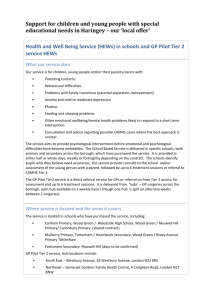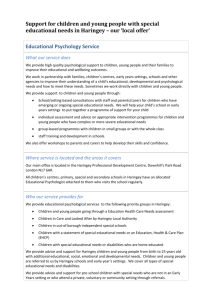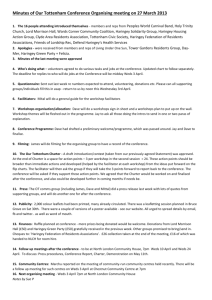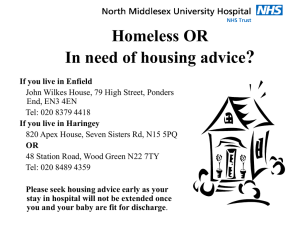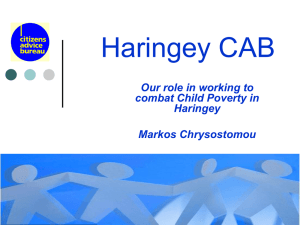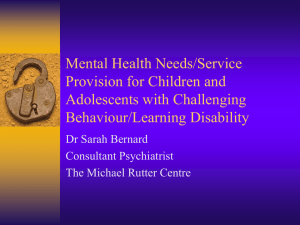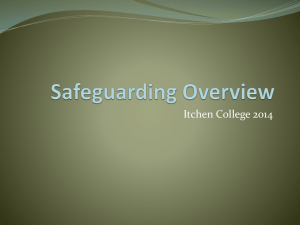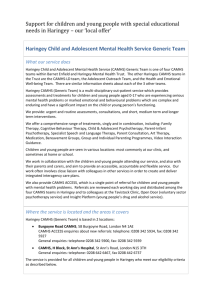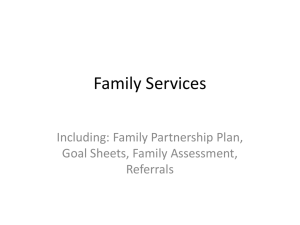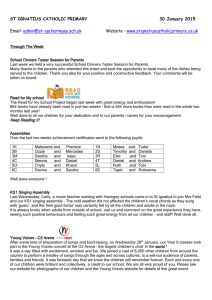HARINGEY CAMHS – Learning Difficulties
advertisement
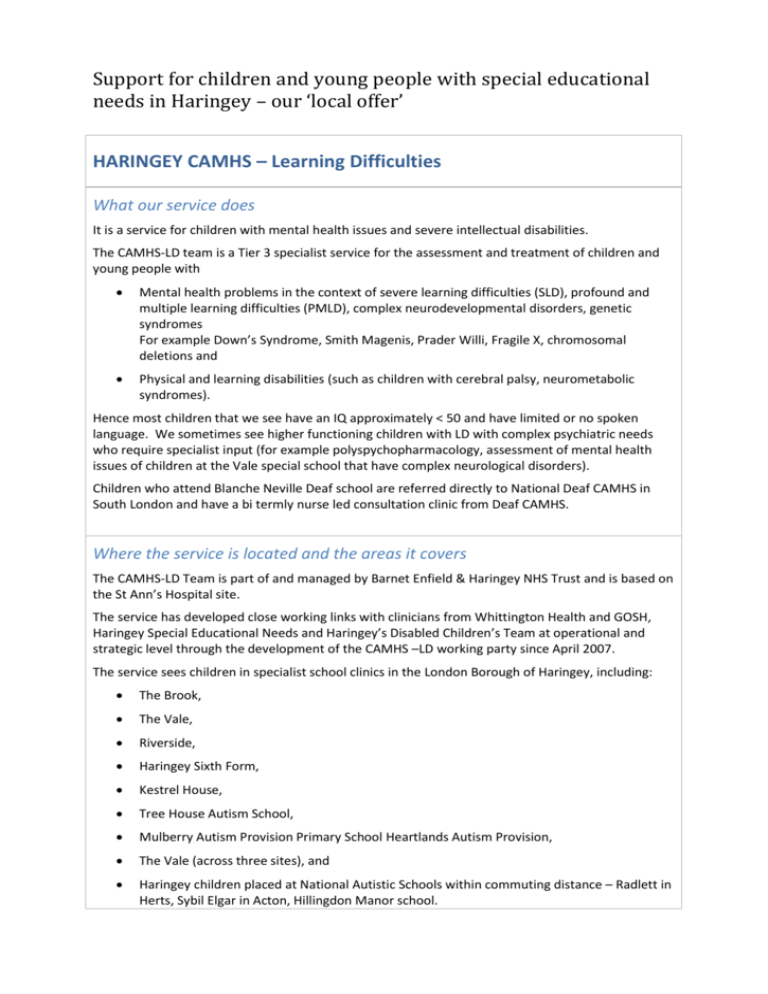
Support for children and young people with special educational needs in Haringey – our ‘local offer’ HARINGEY CAMHS – Learning Difficulties What our service does It is a service for children with mental health issues and severe intellectual disabilities. The CAMHS-LD team is a Tier 3 specialist service for the assessment and treatment of children and young people with Mental health problems in the context of severe learning difficulties (SLD), profound and multiple learning difficulties (PMLD), complex neurodevelopmental disorders, genetic syndromes For example Down’s Syndrome, Smith Magenis, Prader Willi, Fragile X, chromosomal deletions and Physical and learning disabilities (such as children with cerebral palsy, neurometabolic syndromes). Hence most children that we see have an IQ approximately < 50 and have limited or no spoken language. We sometimes see higher functioning children with LD with complex psychiatric needs who require specialist input (for example polyspychopharmacology, assessment of mental health issues of children at the Vale special school that have complex neurological disorders). Children who attend Blanche Neville Deaf school are referred directly to National Deaf CAMHS in South London and have a bi termly nurse led consultation clinic from Deaf CAMHS. Where the service is located and the areas it covers The CAMHS-LD Team is part of and managed by Barnet Enfield & Haringey NHS Trust and is based on the St Ann’s Hospital site. The service has developed close working links with clinicians from Whittington Health and GOSH, Haringey Special Educational Needs and Haringey’s Disabled Children’s Team at operational and strategic level through the development of the CAMHS –LD working party since April 2007. The service sees children in specialist school clinics in the London Borough of Haringey, including: The Brook, The Vale, Riverside, Haringey Sixth Form, Kestrel House, Tree House Autism School, Mulberry Autism Provision Primary School Heartlands Autism Provision, The Vale (across three sites), and Haringey children placed at National Autistic Schools within commuting distance – Radlett in Herts, Sybil Elgar in Acton, Hillingdon Manor school. We also see some children with statements or EHC plans who are home schooled, or in main stream schools. Who our service provides for Children and young people from 2 years old to 17 years and 9 month old, living in Haringey, who meets the eligibility criteria as stated below can access this service. We provide transition to Haringey Adult Learning Disability services around their 18th birthday. Under 2 year olds usually access the Parent Infant Psychology Service (PIPS) team based in the children’s centres or Child Development Centre as it is unlikely they will have a mental health issue at this age. Children and young people whose mental health, emotional and/or behavioural problems do not meet the eligibility criteria, but who could benefit from a time limited intervention, can potentially access the CAMHS Tier 2 services from the Haringey Health and Emotional Wellbeing Service (HEWS). Further information about this service is available in a separate service description. If a Haringey child under our service becomes looked after and is resident outside of Haringey, and is registered with a non- Haringey GP, their care is transferred to the local CAMHS-LD service with a transition period. Children and young people in care to Haringey Council, living in Haringey and registered with a Haringey GP, are typically referred by their social worker to access our services. How a young person can start using the service Eligibility Criteria Residency The service is available to Haringey residents. This includes children placed in non- residential schools located outside the borough within a 60 minute travel radius from St Ann’s. This does not include children placed in Haringey schools that are non- Haringey residents Age New referrals will be accepted up to the age of 17 years and 6 months Diagnoses All children must have: An ICD 10 diagnosis of Moderate Mental Retardation (IQ 35-49), Severe Mental Retardation IQ (20-34) or Profound Mental Retardation. (IQ under 20) – we do not expect referrals to have this information; we would look at the child’s developmental assessment and educational levels to inform us of this as an estimate Hence all children in educational terms have 'severe learning difficulties' SLD or PMLD It will be expected that these “severe learning difficulties” have been identified before a referral can be made And in addition present with any of the following: Significant aggression/challenging behaviours putting the child or others at risk or a sudden change in behaviour Severe self injurious behaviour Playing with fire Risk to self due to significant impulsivity/hyperactivity Restricted/aversive eating patterns – “ Behavioural feeding issues” (separate pathway) Significant sleeping difficulties Extreme ritualised behaviours/obsessions Hearing voices/paranoa/psychosis Tearfulness/low mood/mood lability At risk of placement breakdown Acquired brain injury Genetic disorder where there are behavioural problems Consideration for consultation may be made in exceptional cases for children with complex care needs that do not meet the referral criteria for the Haringey CAMHS-LD (i.e. higher functioning IQ>50, <70) – for example children under Dr Santosh at GOSH on multiple medications, and children at the Vale school with higher IQs in the LD range. Second opinions on existing cases held by CAMHS may also be made. Medical/organic causes for the challenging behaviours need to be excluded before a referral is made. The Referral Process An assessment can only begin once a written referral is received and allocated via CAMHS ACCESS on a CAMHS referral form/CAF form Referrals can be made by senior clinicians at the Child Development Centre (CDC), School Doctors, CAMHS, school nurses, Headmasters/mistresses, Speech and Language Therapists (SLT and GPs. It is advised that referrals from Education and Social Services are initially consulted with School Health through discussion in the regular multi-disciplinary team meetings held in all the special schools. Consultation pathways for school therapists to act as a triage for referrals to CAMHS-LD At present referrals will not be received from voluntary agencies or direct carer referrals New referrals will be screened for risk and urgency by the CAMHS-LD Team, and will be prioritised for assessment accordingly. We offer first appointments within 13 weeks of point of referral to CAMHS ACCESS. How decisions are made about eligibility for our service CAMHS Access clinicians decide based on the above criteria for referral onto CAMHS-LD and then the referral is reviewed by the lead consultant or principal psychologist. There is a referrals meeting once a week. If the child does not meet the referral criteria for CAMHS LD, the child may been seen by the generic service if the generic service eligibility criteria are met, or we assist in signposting to other community services. How we communicate with service users and how they are involved in decision making/planning Parents are contacted with a letter for first appointment within 13 weeks of the referral being received (copied to the GP and referrer) and are phoned a week before to reconfirm attendance, and confirmation of whether an interpreter is needed. Forms are also sent which act as a screen to help reduce the time taken in the appointment including forms that the parents ask the school to complete. This guides us to what the parents and school’s main objectives are for the referral to CAMHS. (The referral form also states whether an interpreter is needed) The process of assessment is explained to the parent at first appointment. Consent and explanation of confidentiality regarding sharing of information and a provisional plan is made at first appointment. Further assessments are – further clinic attended by parent only , school based observation, meeting with parent and professionals at school, medical of child with school nurse and parent, feedback to MDT and parent with joint consensus of what treatment is appropriate, goals that parents would like to work to improving (e.g. sleep, reduce aggression, DLA higher rate mobility). The parents are given a detailed assessment reports and copied into all correspondence. The child is central to the assessment and intervention process, and to ensure opportunity for the child to communicate their likes and dislikes, for example, using a visual rating scale to help facilitate communication of different feelings where appropriate. How accessible our service is We are in keeping with the DDA – and are an accessible service that brings the team to the child rather than the child to us. If the parent and child do need to come to clinic we have disabled parking in front of clinic, and the clinic is on ground floor. Usually we prefer to see children in school or home rather than at St Ann’s so their routine is not disrupted. We tend to see parents during school hours as most of them need to be available at home for school bus pick up and drop off. We offer telephone appointments and reviews and parents can phone and leave messages with prompt responses to messages. Urgent issues are addressed a soon as clinician is available. We also need to be accessible to school health and staff that are also managing challenging behaviour during the day at school and they can contact us by mobile, email and via the clinic reception. We also welcome and encourage close links with Markfield and FABLE, HARTS and the Disabled Children’s Team (DCT) and co work to support families in a holistic way; these agencies all have our contact details. Training our staff have had in supporting children and young people with special educational needs and disabilities All the team are highly qualified in management of children with learning disability. Consultant Child Psychiatrist – medical doctor with postgraduate training in paediatrics and psychiatry Psychologists are both highly specialist and have doctorates Specialist training in Autism Diagnosis, Pharmacology, and Cognitive Assessments Up to date continuous professional development for safeguarding, health and safety, risk assessment, breakaway training, information governance, membership of various professional bodies, including Royal College of Paediatrics, Royal College of Psychiatry, British Psychological society, ACAMH and special interest groups for children with LD Who a service user should contact if they want to raise a concern or complain about something A service user who wishes to raise a concern or complain about something can contact Fidelis Chibwe, Interim Team Manager, Haringey CAMHS Email: Fidelis.Chibwe@beh-mht.nhs.uk Telephone: 0208 342 5900 Who a parent carer/young person can contact for further information If a child is already known to the Service, they should contact their named therapist via St Ann’s CAMHS reception: Amelia Meheux Email: Amelia.Meheux@beh-mht.nhs.uk Telephone: 0208 442 6467
